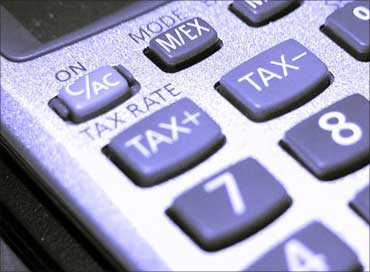Photographs: Rediff Archives Alok Patnia, Taxmantra.com
Most important thing to know is even if you do not have taxable income you may still have to file your income tax return.
The financial year is over, and we have to file our IT returns for the year gone by. Salaried individuals and other non-audit tax payers are required to do their income tax return filing compulsorily before July 31, 2013, for the year ended March 31, 2013 (i.e., for the year ended March 31, 2013 due date is July 31, 2013). This article is for the individuals who are filing their income tax return for the first time.
Who is required to file IT returns?
We see that many a salaried employees are under the impression that since their employer has already deducted income tax at source, they have discharged their liability, which is not the case. Payment of taxes and filing of income tax return are two separate obligations.
As per the present provisions of Income Tax laws, an individual whose gross total income exceeds the exemption limit has to file her/his income tax return though s/he might have paid all the taxes or taxes have already been deducted from her/his income.
Gross total income under the income tax laws means the total income before giving effect to deductions under chapter VI A which for individuals generally covers deductions under various sections for payments of provident fund, life insurance premium, tuition fee for education for child, NSC, contribution to NPS, PPF, home loan repayment, health insurance premium, rent paid and deductions for investments made under Rajiv Gandhi Saving Scheme etc.
So even in the cases where taxable income is below the exemption limit after the above deductions, you will still have to file your income tax return even when you may not have any tax liability.
This exemption limit presently is Rs 2 lakh for an ordinary individual taxpayer. For a senior citizen, this limit is Rs 2.5 lakh and for the senior citizens above 80 years, the basic exemption limit is Rs 5 lakh.

Filing income tax for the FIRST TIME? Things you must know
Photographs: Rediff Archives
For example
Suppose your taxable salary as per Form 16 issued by your employer is Rs 2.8 lakh and you have other income of Rs 10,000 thus making your gross total income Rs 2.9 lakh.
Since you have invested an amount of Rs 1 lakh in items eligible for deduction under Section 80 C, your taxable income comes down to Rs 1.9 lakh, and therefore your employer would not have deducted any tax.
You may be under the impression that as your net income is below the exemption limit and since no income tax has been deducted from your salary, you need not file your income tax return. This is not the correct position of law and the right impression to have, but generally people are under this impression.
However the legal provision is different. You have to calculate your income before deduction for various deductions like life insurance premium, mediclaim insurance, housing loan repayment and school fee for your child etc.
In case your aggregate income before deduction for these expenses exceeds the basic exemption limit as mentioned above, you are required to file your return of income.
Filing income tax for the FIRST TIME? Things you must know
Photographs: Rediff Archives
By when should an individual file his/her return?
The due date for the year just concluded is July 31, 2013.
Disadvantages if an individual misses the above date of July 31, 2013
In case you fail to file your return by the due date as prescribed by law, you can still file your return of income by March 31, 2014 for the year ended March 31, 2013 but you will not be able to revise your return of income in case you notice any mistakes or errors in the return of income filed beyond the due date of July 31, 2013.
Moreover in case any amount is still payable as tax on your total income, you will have to pay penal interest on the amount of tax till you actually file the return.
Moreover in case you have incurred any loss in respect of business, or any speculative business or capital gains and want the same to be carried forward for set off in subsequent year, you will have to file the return by July 31, 2013 or your claim for carry forward and set off of such loss shall be lost for ever.
Therefore it is advisable to file your returns by the due date.
Filing income tax for the FIRST TIME? Things you must know
Photographs: Rediff Archives
Is there any penalty if an individual fails to file till last date?
There is no penalty if you file the return of income for the year ended March 31, 2013 by March 31, 2014. However if your income is taxable and you fail to file your IT returns by March 31, 2014, the income tax officer can levy a penalty of Rs 5,000 after giving you a notice to explain the reasons.
So from the above discussion it is clear that though you may not have taxable income but you still may have to file the income tax return. Moreover in case you have taxable income it is advisable to file the return by the due date so that you can revise the return in case any mistake is noticed afterwards.





Comment
article